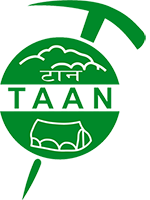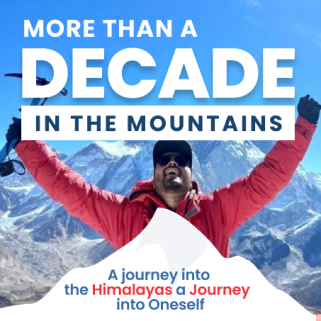
Things to Know Before Going to Nepal

Things to Know Before Going to Nepal
swotah travel
981
07, 03 2023
It's not that long ago that everyone you met on the travelers’ trails had a copy of Lonely Planet or Rough Guide in their hands. Those books were considered the ‘bible’ of every traveler as they were created to provide information on where to go, what to see, and the background of a given country or area. The Lonely Planet was in fact created by its original founder, Tony Wheeler, on his travels around the world when he found it difficult to get advanced information on different countries. As the market for guidebooks grew, travelers devoured the information on each page before setting off and used the book as both a map and an encyclopedia.
Today, we don’t see many people carrying guidebooks. Mainly because all the information we ever need to know about a particular country can be found online, but that has led many to think it is not necessary to look up information before arriving in a country as it is always on our phones or laptops. I’ve seen people get off a bus, and instead of looking up at the signposts in the bus station or asking a local, they look down at the map on their phones.
We might think when we reach our destination, we will sit down on and do our online research on the first day. But then excitement and circumstances take over, and we may never spend quality time on this research.
How Does Research Make You a More Humble Traveller?
By finding out more about the places and peoples of the country you are visiting, you can better appreciate how they live. You know they will be different from the folks in your hometown – that’s why you are traveling, to explore new things – but just how different will the people and places be?
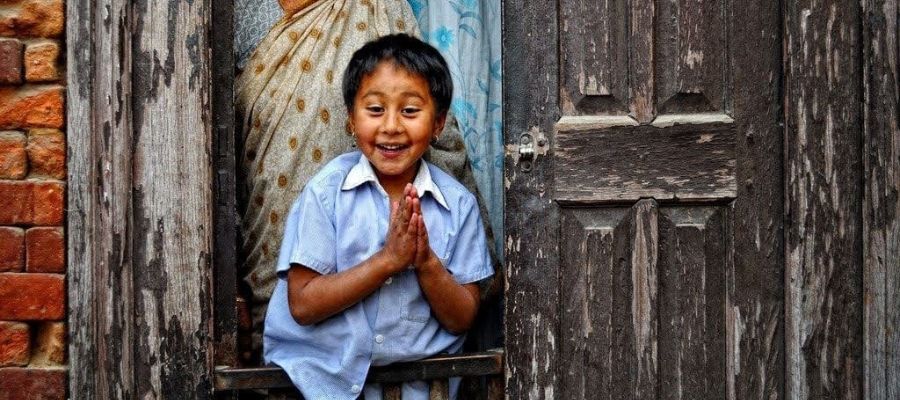
Let’s Look at Nepal – Things to Know Before Going to Nepal
Things taken for granted in Europe and America are not always available. For example, it is only in very recent years that ATM machines were widely available. And in some areas, they still don’t exist. Asking a small local shopkeeper on the trail to accept your international Mastercard may also be hoping for too much!
Hot water. Not always available. Electricity to charge your electronics. Not always available, or there is a price to pay. Feminine hygiene products. Not always available.
So, as you can see, you really need to plan ahead for even the simplest things we normally take for granted.
And not just on logistics. You need to take a look at the culture of a country and adapt your behavior accordingly. Remember that what you experience at 1 am in the clubs in Thamel is not what you will see on the trekking trails.
Tips for Being a Considerate Traveller
You can get a lot of first-hand information from other travelers’ blogs, so you could check them out. But here are a few tips to get you going.
1. Be respectful
Most of the population, especially in rural areas, are still quite conservative. Please respect this by dressing appropriately and talking in a respectful manner. If visiting someone’s home, please remember Nepalis do not wear their shoes inside the house or a temple. Leave yours at the door. Whether you agree or not, the senior male of the house has the last word, and you should be more respectful to him. Don’t touch idols in the house or touch the top of anyone’s head. Try to eat everything you are given. They might have gone to great lengths to provide food for their guest – don’t waste it.
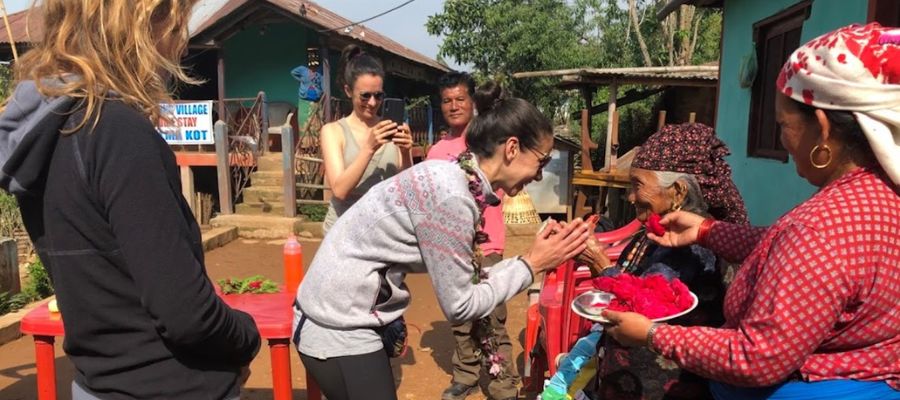
Photo: Tourist Receiving Warm Welcome from Local Community
2. Bargaining
It is fine to bargain in places like tourist shops in Thamel, but in general, although bargaining is part of the overall culture, outside of tourist areas, you will not be getting ripped off. Does it matter if you are paying Rs10 more than a local for a bunch of bananas? You may feel everything should be equal, but let’s face it, you, the tourist, have gotten off a plane, stayed in hotels, and have money in your pocket. You can’t blame locals for thinking that Rs10 is not so important to you. Naturally, if you really feel something is too expensive, just walk away. You have that choice.
But remember, on the trails, it can take days for provisions to reach some lodges so what is relatively inexpensive in Kathmandu or Pokhara will definitely be more costly on say, the Annapurna Circuit Trek.
3. Join in
If you are traveling with a guide, he will know if there is a festival or social gathering in the area and can take you there. As a visitor, particularly in areas which see less tourists, you will attract a lot of attention. Children will want to ask questions, and people will stare at you. It takes quite a bit of time to get used to people from this part of the world staring – particularly as it’s not something generally done in Europe or America. Don’t worry! People are just curious. Some ethnic groups, for example, the Tharu in the lowland areas (Chitwan National Park, etc.), have pretty serious-looking faces. They, too, are just curious, not threatening.
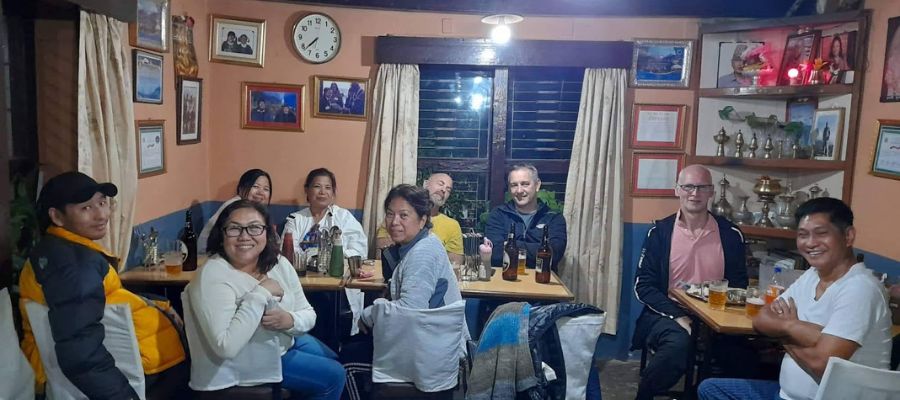
If you are alone, then it is best to be invited to join the festival before diving in. There are some national celebrations open to everyone i.e., Holi, but if you are unsure, please wait to be invited. You don’t want to gatecrash some one's wedding!
By joining in – and if there is dancing, it is pretty compulsory for visitors to take part – you will break the ice and come over as friendly and receptive.
4. Photography
It’s much easier in these days of cell phone photography to get pictures of others without them being aware. But it is morally correct and polite to ask permission. In general, everyone loves getting their photographs taken and will want to see the results on your screen! But please ask first. Children and some of those (fake) sadhus might ask you to pay to take a photo. Don’t encourage this behavior by paying. Not even by giving sweets to children. The exception is if you are in a homestay, then yes, it is fine to give something to the children as a thank you to the family.
5. History
By learning something about the country’s past, you will have a better idea of why things are done in a certain way. No need to become a historian, just knowledgeable enough that things begin to make sense. Same thing can be said about politics. But all credit to you if you figure out how politics in Nepal works!
6. Language
There are quite a few languages in Nepal, but the main one is Nepali. Learning a few phrases would be handy when moving around, although you will find there is usually someone who speaks a little English everywhere. Children and young people will be delighted to practice their English language skills with you!
7. Religion
The majority of the population is Hindu, with a good smattering of Buddhists. And then, to confuse things, the indigenous people of the Kathmandu Valley, the Newars, practice a religion that combines Buddhism with Hinduism. Please be aware while tourists are allowed into all Buddhist religious sites, there are some Hindu temples and sites that non-Hindus are not allowed into. For example, the main temple at Pashupatinath in Kathmandu. Again, be respectful when visiting any religious sites. If staying in a gompa (Buddhist ‘temple’), do not take meat (or leather goods) and alcohol. Do not smoke in the compound or rooms.
See our blog on the Six Most Popular Festivals in Nepal for more information as to festivals that might be of interest to you.
8. Cultural Differences
When asking for directions, be aware no one likes to disappoint. So instead of saying ‘I don’t know’, you may be sent off in any direction! ‘No’ is not a word Nepalis like to use as they don’t like to upset or disappoint. If you are here long enough you will begin to work out that ‘yes’ can mean ‘I don’t know’ or ‘I don’t think so, but don’t want to tell you that’! Don’t try to argue about it. No one wants to lose face, and arguing will get you nowhere. It is also something that is not generally done. You may well see people arguing loudly, but that is really their last resort. As a visitor, try not to lose your temper in any given situation.
Being laughed at is something that is going to happen to you in Nepal! If you fall over your own feet (as long as you are not seriously injured), that is going to be followed by giggles from bystanders, even friends. They are not laughing at your predicament but are embarrassed for you and do not know how to react. You should also just join in the giggling to show you are not hurt.
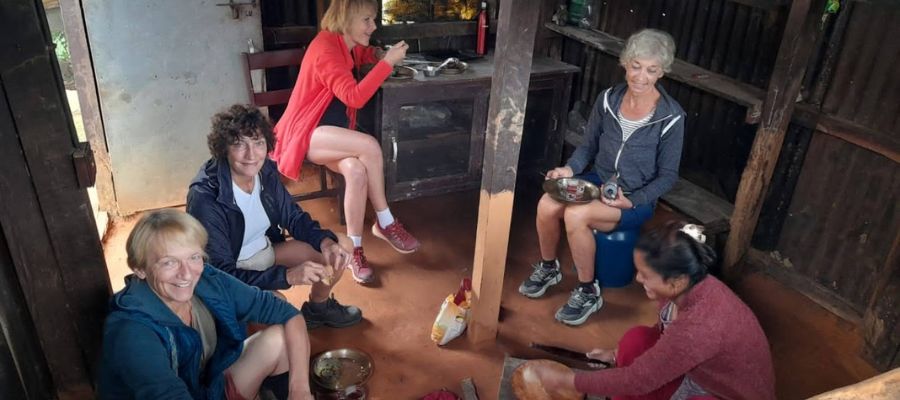
Photo: Tourists Gathered to Watch Homestay Hosts Prepare Local Cuisine
Standing too close. COVID aside, strangers here will stand closer to you than they would in your home country. They are not being nosey (well sometimes just a little!) its just the way it is. Everyone wants to be first in the line for the bus, cinema, etc. Hold your own, and don’t be offended. For those who want to see what you are doing on your phone, or listen to your conversation, either turn away or simply smile. You can ignore them or invite them to see your latest selfie etc.
Saying thank you. Saying thank you is not really done here. That is saved for the really big actions, not just because someone handed you a cup of tea. Don’t think it is not appreciated if you give sweets to your host's children or give a tip in a local restaurant, its just not in the culture to say thank you. And likewise, people are often surprised and how often we tourists say these words! Think about it – we really do say thank you dozens of times a day for the smallest of things!
9. Go with the Flow
As you move around, you will come across many more cultural differences. Just go with the flow! After all, that is what traveling is all about – learning new things and meeting new people. And be humble while you do it!
NEWSLETTER SIGNUP
Sign up to receive our trip ideas and travel offers!
Get updates and Exclusive Offers up to 20% Discount




